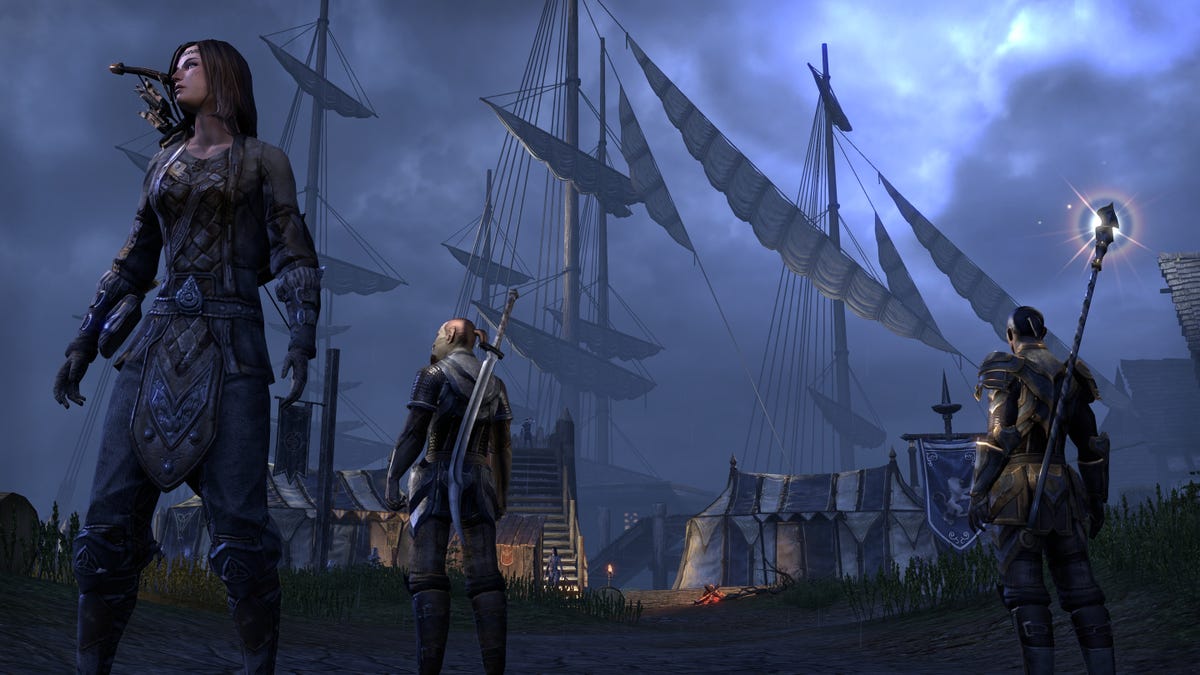The tiny details that make giant video game worlds believable
Even if you're just there to kick ogres, an underlying foundation of lore holds it all together.

The Elder Scrolls Online focuses not only on the main story, but the context and lore behind it all.
When it comes to video games, the devil is in the details. The tiny, almost imperceptible choices that make the world not only feel lived in, but unique. A specific type of wood for the table in the corner. The stray note on the table written with the right ink and syntax for the time period.
It's often referred to as "lore". The miniscule pieces of world building you don't notice actively.
But without them, the world feels hollow. Unfinished. And it's those underlying details that can elevate a good story into a great experience.
According to Leamon Tuttle, the loremaster of Elder Scrolls Online, the details you brush over reveal far more than you'd expect.
Leamon Tuttle has been Loremaster of Elder Scrolls Online since 2019.
Elder Scrolls Online is a massively multiplayer online role-playing game that features a sprawling fantasy world, multiple races and cultures for players to experience, and the opportunity to delve deep into a rich history.
"If you think about going out for dinner, lore is setting the table -- getting the silverware where it needs to be and having all those things kind of set," he says. "The story is the meal -- people are using what you've got there to create an experience."
And from narrative designers to environmental artists -- and, indeed, loremasters -- getting the details right makes a world of difference.
"That's what really makes the world feel real," says Tuttle. "So if you see a statue, you've got the surface level of, 'okay that's the statue of Meridia' or something like that. But when you go deeper, what is that statue made of? Who made it? How long ago? And those are the kinds of questions that actually make the world feel lived in."
Not everyone will notice... or care
For some players, lore is irrelevant. They don't stop to read notes left behind in abandoned villages, or seek out information in codex entries or books. They just want to play -- but they still get the value even if they don't realise it.
"So that's step one -- to make sure that things move along at a reasonable pace for people who just want to go out and kick ogres in the face."
"We are acutely mindful, or aware of the fact that there are different types of gamers who want to play in different ways," says Tuttle.
"Given that it's an interactive medium, we don't want to get in anybody's way. So that's step one -- to make sure that things move along at a reasonable pace for people who just want to go out and kick ogres in the face."
But the presence of these cultural insertions helps make you feel more entrenched in the universe. If you're not noticing anything, good! It means there's nothing glaring or out of place in the world-building and context of the game. It exists to accent the narrative in a way that makes the experience fluid and natural, not to make it the focal point.
"For the most part we definitely want to make sure that the narrative is something fun," says Tuttle. "It enhances the experience but it doesn't get in anybody's way, if that's not necessarily what they're interested in."
Keep it straight
But crafting these details and keeping them all consistent isn't easy.
According to Tuttle: "It's a lot of documentation. It's a lot of emails, a lot of Word docs. We have an internal wiki called Confluence where we store a lot of this stuff."
On a game with the scale of Elder Scrolls Online -- especially featuring so many different races and cultures -- it's no simple task to keep all of the information straight.
"We create style documents when we're going into a new zone. For instance, when we were heading into Murkmire, I wrote up a document -- here are all the tribes, here all the cities, here are the customs between the tribes, this is the history of the area."
The new Murkmire zone opens the world up for more lore and background.
For Tuttle, it helps that he majored in history and philosophy. That in-depth understanding of how culture and context impact on an experience is priceless -- history allows you to create a space that feels real, but then philosophy is the 'why'.
And the 'why' is different for each zone, each race, each culture. All the lore in The Elder Scrolls is delivered through the people who live there -- it's a matter of perspective and opinion, so the player decides who to trust and who's an unreliable narrator.
It allows the player to really feel a part of the story, to feel a connection with their character, especially in a game like Elder Scrolls Online.
"When people don't have a fully developed understanding of the culture, they're less likely to want to dive in, because there's just not as much meat on the bones," he said. "The more that we develop these races and their history, it brings players into that fiction in a more authentic way."
And when that's the entire point of the game, it's hard not to give credit where credit is due. The unexpected detailing, the specific materials or backgrounds, the tableware that makes up the foundation of the story -- it makes for one hell of a meal.

